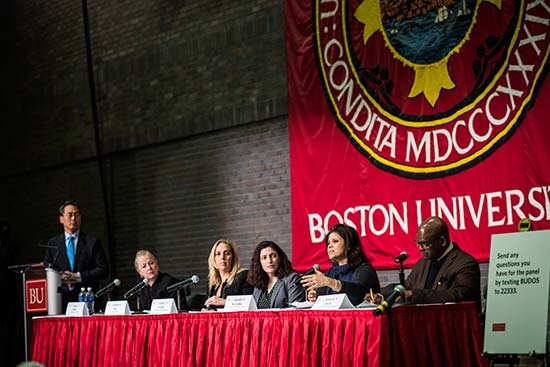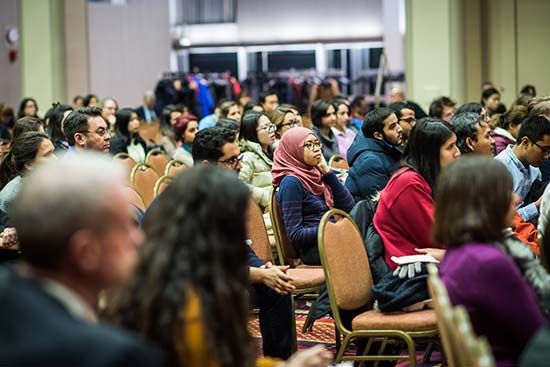Guidance and Support Offered to International Students
A town hall meeting helps explain a confusing travel ban

Moderator Willis Wang, vice president and associate provost for global programs (from left), and panelists Jeanne Kelley, ISSO managing director, immigration lawyer Elizabeth Goss, Jennifer Grodsky, vice president for federal relations, Alejandra St. Guillen, director of Boston’s Office for Immigrant Advancement, and Kenneth Elmore (SED’87), associate provost and dean of students, at Tuesday’s panel discussion on the Trump administration’s executive order on immigration.
The situation is fluid. Be conservative. Ask for help. Don’t go through this alone.
That was the advice to international students at the BU Town Hall Meeting: President Trump’s Executive Orders on Immigration, which drew about 150 people to the George Sherman Union’s Metcalf Hall on Tuesday evening. A show of hands revealed that international students made up at least half of the audience.
“The University is going to make sure it’s about care,” said Kenneth Elmore (SED’87), associate provost and dean of students. “You should not face the anxiety that you feel alone.”
Elmore said students should use his office as well as the International Students & Scholars Office (ISSO), Marsh Chapel, and others as places to get help for anything that’s worrying them, from making difficult travel decisions to finding a shoulder to cry on.
While the University will not violate the law to protect students from authorities, he said, it does not collect info on students’ immigration status, so if such information were subpoenaed, BU has nothing to turn over.
The meeting was intended to relieve some of the widespread anxiety among international students, who have been stunned and dismayed since last Friday when President Donald Trump signed an executive order banning all refugees from entering the United States for 120 days, blocking entry for all residents of Iraq, Iran, Libya, Syria, Somalia, Sudan, and Yemen for at least 90 days, and indefinitely banning all refugees from Syria.
“It sends a larger message to the whole world, an awful message that we are not accepting of a certain group of people,” said moderator Willis Wang, vice president and associate provost for global programs. “In many ways that’s just unacceptable and intolerable.”
The event, sponsored by Global Programs and the Dean of Students office, was designed so students could ask questions from microphones or anonymously via text, and many took advantage of the latter option. Several questions were hard to answer with any specificity, because the administration’s enforcement efforts are inconsistent and confusing.
“It’s a very fluid situation,” said Jeanne Kelley, managing director of the ISSO. “We are continuing to try to get answers.”
She and immigration attorney Elizabeth Goss answered specific questions about green cards, various internship programs, dual citizenship, and foreign travel plans, as well as lawsuits aimed at blocking the executive order. They emphasized that the administration may change or even accelerate its efforts, and that more countries could be added to the original seven.

Kelley told any students from one of the seven countries named in the executive order that anyone considering travel outside the United States should “be conservative and be sure to make really good decisions before you leave.”
“If you are going for a sick parent, I might say one thing. If you are going for a week’s vacation, somebody might advise you another way,” she said, adding with a smile, “Traveling within the United States is a really good idea right now.”
Alejandra St. Guillen, director of Boston’s Office for Immigrant Advancement, told the group that Mayor Martin J. Walsh “wants to extend his support of efforts against the executive order and for all of you who live, work, and study in Boston.”
The executive order “has touched him in a very visceral way and he has been an outspoken opponent,” she said, noting that her office holds regular immigration workshops for those who need help. “Whether you are here for four years or here for 40 years, you are a resident of Boston and you deserve all the rights that everyone else does.”
Jennifer Grodsky, BU’s vice president for federal relations, said many people on Capitol Hill were surprised by the language and tone of the executive order as well as its intent. She said Congressional staffs are working nights and weekends to keep up with constituent input, as “the phones are ringing off the hook. The level of energy in Congress is higher than I’ve seen it in some time.”
Grodsky said her office shared President Robert A. Brown’s statement to the BU community with the Massachusetts Congressional delegation and other friends in Washington to let them know what the impact was at BU and how the community was feeling about the executive order.
BU has 102 undergraduate and graduate students and 16 scholars from the seven countries that are under the 90-day ban, and many more international students and scholars. The executive order spurred numerous legal challenges and massive rallies in many cities, including Boston, on Sunday, as well as a smaller demonstration Monday on campus, at Marsh Plaza.
Many events about the travel ban are being held around campus. Today, Wednesday, February 1, at 4 p.m., as part of its Beyond the Headlines series, the Pardee School of Global Studies will host a Town Hall discussion, Refugees, Immigration, and Us, with faculty and students, at 121 Bay State Rd. Limited seating is available. Register by email at EventsPS@bu.edu.


Comments & Discussion
Boston University moderates comments to facilitate an informed, substantive, civil conversation. Abusive, profane, self-promotional, misleading, incoherent or off-topic comments will be rejected. Moderators are staffed during regular business hours (EST) and can only accept comments written in English. Statistics or facts must include a citation or a link to the citation.